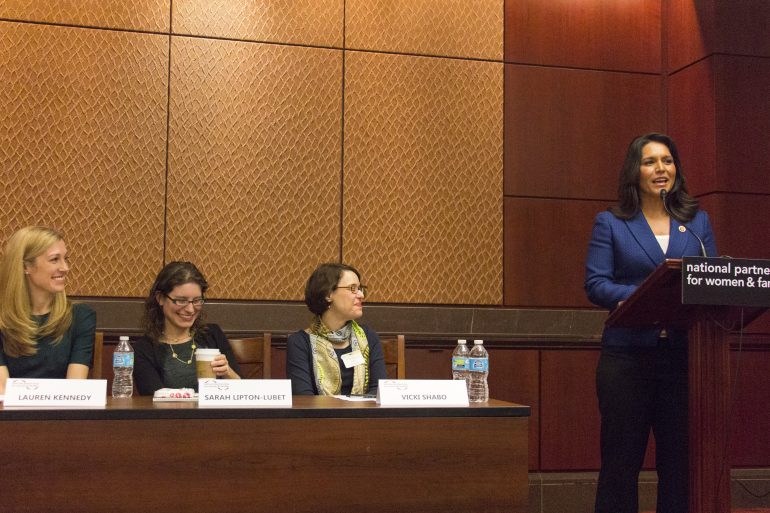
WASHINGTON–Advocates and two congresswomen called for laws and policies that will guarantee fair treatment of women in the workplace at a congressional briefing Wednesday.
“I’m going to keep up the fight to protect a woman’s constitutional right to make her own choices about her own body. That means that we’re going to have to push back very hard on proposals that we’re seeing unfortunately already from the Republicans, which are going to turn back the clock for women’s rights,” Sen. Patty Murray, D-Wash., said.
Rep. Tulsi Gabbard, D-Hawaii, emphasized the importance of mobilizing people around the country to put pressure on Congress.
“We won’t be able to get anything done unless and until that pressure is … applied by people who really hold the power, and that is people in our communities,” Gabbard said.
The briefing, sponsored by the National Partnership for Women & Families, took place at the Capitol Hill Visitor Center.
This year members of Congress have proposed 19 abortion restrictions and anti-choice laws, said Sarah Lipton-Lubet, director of reproductive health programs for the National Partnership for Women & Families.
Members of Congress have also introduced bills aimed at repealing the Affordable Care Act, President Barack Obama’s signature health care reform law designed to lower health care costs and increase the affordability of health insurance, said Lauren Kennedy, director of health policy for the National Partnership for Women & Families.
Despite this opposition, Debra L. Ness, the president of the organization still seemed confident, “…we don’t wait until there’s a more favorable landscape, we work, we keep going and we make progress step by step…we can make progress with this congress,” she said.
Vicki Shabo, the vice president of the National Partnership for Women & Families, stressed the importance of passing several acts to help women in the workplace.
One was the Family and Medical Insurance Leave Act, which would create partially paid family or medical leave for up to 12 weeks and is modeled on paid leave programs in California, New Jersey and Rhode Island.
Having access to paid leave is related to the wage gap for women, because if they are cycling in and out of jobs, it is more difficult to climb the wage ladder, Shabo said.
Shabo also cited the Paycheck Fairness Act, which will be introduced next month and can help close the wage gap by requiring employers to give legitimate, job-related reasons for paycheck disparities.
Finally, Shabo mentioned the Pregnant Workers Fairness Act, which promotes health and economic security for pregnant women and their families.


You must be logged in to post a comment.